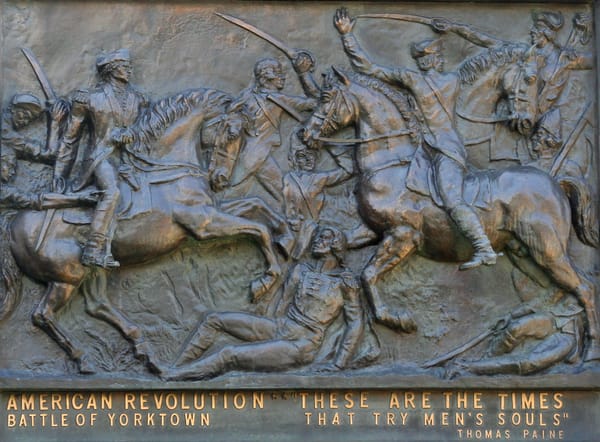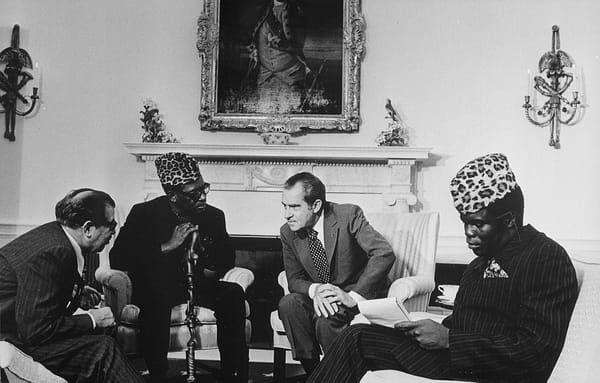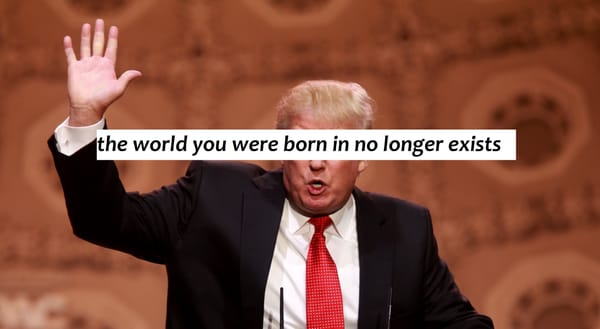How Hot Takes Expand Our Capabilities

Drawing primarily on Karl Popper, Oliver Traldi argues that hot take culture diminishes our desire or ability to quietly reflect on events. In addition, they subsume complex human events into simplistic and pre-determined theories. Against this, I will draw on Charles Taylor’s philosophy of language and Hans-Georg Gadamer’s philosophical hermeneutics to argue that hot take culture expands our capabilities. It does so by expanding the publicly available resources for improving our understanding.
The three levels of language
Taylor creates a three-level taxonomy of language, with high levels of articulation at the top, naming in the middle, and the physically enacted level at the bottom. He illustrates this latter concept with the example of a biker’s way of carrying himself, his body language.
The biker’s world incorporates the strong value of this way of being. Let’s call it (somewhat inadequately, but we need a word) ‘machismo’. But how does this meaning exist for him? Only through the expressive gesture and stance. It’s not just that an outside observer would have no call to attribute machismo to him without this behavior. It is more radically that a strong value like this can only exist for him articulated in some form. It is this expressive style that enables machismo to exist for him, and more widely this domain of expressive body language is the locus of a whole host of different value-coded ways of being for humans in general. The expression makes possible its content; the language opens us out to the domain of meaning it encodes.
At the lowest level, we enact a world of meaning which we may not yet have words for. This is the nature of human practice. Our articulations of the values that are coded into this behavior are necessarily imperfect, just as translation from one language to the next must be imperfect—especially if we are translating something like poetry. We can never achieve pure articulation.
What is more, the effect of articulation—even simply at the level of naming—is not neutral. To articulate a rationale, or to name some aspect of a practice (or the practice itself) that was previously unnamed, transforms the nature of the practice. Even if that rationale is inaccurate, the practice may be revised to be more in accordance with it. Or it may prove resistant to it in unanticipated ways. But it is unlikely to remain unchanged.
Enacted practice has multitudes of meaning which we can only imperfectly express in words. Artistic portrayal is the same. Though a character in a narrative may give a didactic speech—and the worst fiction can be quite heavy-handed with this device—for the most part, narratives disclose much more than they say explicitly. Even the didactic speech can be employed ironically; the reader or viewer can be meant to take away the opposite message. Subtler narrative provides speeches that are only partially true, and it is left ambiguous which part is which.
Our ways of being in the world are made up of complex, interpenetrating patchworks of these levels of language.
Oliver begins his piece by confessing something he considers shameful: “Sometimes when I see a movie or read a novel and I’m not sure how to react, I search for reviews hoping they’ll tell me how.” This is bad because “It’s an easy way out, a way of avoiding the responsibility of independent thought about a hard problem on the concrete level.”
In Oliver’s view, we ought to take the time to fully process a work of art, rather than asking someone else for their opinion (much less asking them what our opinion ought to be). But you can mull over artistic portrayal forever and never articulate a perspective on it. That’s not necessarily a bad thing; we are certainly overeager for easy answers when there is much to be gained from appreciating art and lived experience on its own terms, without seeking resources to understand it from articulated frameworks.
But those articulated frameworks do provide additional resources we would not have without them. They create possibilities that didn’t exist before; possible ways of being and orientations towards the art and practices in question. New potential skeins of meaning comprised of new combinations of enactment, naming, abstraction, and artistic portrayal. Most importantly for Oliver’s purposes, new ways of understanding the specific phenomena in question; be it a work of art or an event. Works of art and human events are polyvalent by their nature. It takes a great deal of theoretical resources to understand them, something Oliver emphasizes when arguing that the theories we attempt to understand them with are often too simple for the complex phenomena they are applied to.
But I’ll return to that momentarily. The point I want to emphasize here is that the game that hot-takers play generates a frenzy of articulation. Even if most of it is garbage—and when is that ever not the case, for any process of generating content of any sort—it is nevertheless a creative, discovery process which ultimately generates more public resources for understanding what is being discussed than would have existed otherwise. That there are a lot of pitfalls people can get trapped in, with over-simplistic or erroneous understandings, is undeniable. But I don’t think that’s an avoidable risk.
Interpretation is application
Though much influenced by Plato and Aristotle, Hans-Georg Gadamer did not think that theories or ideas have an independent existence. Laws, for example, only have their being in application. To say that a law can be understood purely abstractly is nonsense. Even the legal historian can only understand a law as it has or would apply to specific cases. No legal theorist worth their salt is without a deep foundation in case law. This isn’t to say that such an understanding simply rationalizes the decisions made by judges in the past—Nancy Rosenblum is a good example of someone who draws heavily on case law but makes careful, principled arguments about the errors judges made in given rulings.
What does it mean to say a law is applied?
We might think it involves subsuming the case to the law; that is, redescribing the events so they fit in with the parameters of the relevant law. Stripping them of their particularity. Oliver seems to think this is what is involved in applying a theory, or at least applying a theory in bad faith. He describes writers of hot takes in the following terms:
As we are processing it, other people are writing. Are they people who have already processed the event the way we’re trying to? Not really. Instead, they are people who are devoted enough to a certain theory to think the correct reaction is whatever they can derive from that theory and who are clever enough that they can perform that derivation quickly.
The “hotness” of the take comes from the speed at which it’s produced and the superficial way in which it addresses the event. The superficiality is a feature of derivation itself. The event is presumably newsworthy in part because it involves complex issues that can be seen from multiple perspectives or that could have multiple effects. The theory, as part of being broad enough that it can generate a hot take for almost any event, cannot anticipate this complexity, and so the derivation necessarily fails to address it.
In this telling, theory provides a range of responses to any conceivable scenario, which is made possible only because we can be very selective in the characteristics of the scenario we choose to pay attention to. Distortions beyond selectivity may be required to fit complex events into the straightjacket of simple theory-based narrative.
That this happens is undeniable. But I don’t think Oliver’s argument for how we should process such events is correct, either:
Another element of this process is that concrete, empirical facts have ultimate reign over theories. If an experiment contradicts a well-regarded theory in an unexpected way, we might run the experiment a few more times to make sure we got the right result. But there is no option for us to pick the theory over the fact when they conflict.
What is a “concrete, empirical fact”?
Popper, whose theory Oliver cites in his piece, was trying to square the circle between continental rationalists and British empiricists. Unlike the latter, he held that we couldn’t get anywhere without bold theories, and science at any given time is simply a large body of not-yet-falsified theories. But unlike the rationalists, he tried to give empirical facts the supremacy that Oliver mentions.
Even this is too much stuck in an Enlightenment dichotomy shown to be worthless by Kant, Husserl, and most of all Heidegger. There are no discrete facts nor do we approach events with some articulated theory on hand for the most part. As humans we live in a world of significance, where our perception of events and the world is continuous and we encounter things which have meaning for us due to what Heidegger called the fore-structure of our understanding.
How is this meaning revised? Does this fore-structure ever shift in response to something new we encounter? Gadamer, who was Heidegger’s student, thought that it was constantly shifting. He spoke in terms of our horizons, which provide the whole of the context for our understanding, and could expand or contract. Think of how our horizons expand as we grow up, and we can look back at a childhood memory as we experienced it as a child, as well as with the additional perspective afforded an adult. On the other hand, converting to an extremely tunnel-visioned ideology, or social isolation (such as many elderly experience after retirement), are things which can cause our horizons to narrow.
Tunnel-visioned ideology is what I think Oliver is most afraid of. I agree with him that it is a real danger, and a real danger of hot take culture in particular. The elderly people I have in mind whose horizons narrowed spent most of their new free time watching cable news.
But for human understanding, the relationship between theory and fact is neither one in which theory overwhelms fact nor one in which facts have “ultimate reign”. Instead, it is a hermeneutic circle. We cannot understand the fact without some notion of the totality of meaning which gives it significance. But we cannot learn of this totality without first encountering parts of it. In a sense, we need the fact to understand its context, but we need the context to understand the fact, or even to see it as a fact.
It’s often framed in this almost playful way at first in order to suggest a paradox, but this is easily resolved when we recognize that both our understanding of the totality of context and of the fact are provisional. As I put it elsewhere:
For Gadamer, our horizon is a provisional understanding of the whole, and our prejudices are in turn our provisional understanding of a given part that we encounter.
To make this concrete, consider a novel. After finishing a given chapter of a novel, we no doubt have certain expectations about what the book as a whole will be like, based not only on the chapter itself but on our understanding of the genre conventions the novel is operating within, maybe even of our familiarity with the author herself or what other people have insinuated about the book. Once we have completed the novel, however, our understanding will have changed—not only of the novel as a whole, but even of a given chapter and its significance. Rereading the novel, we may find the chapter discloses things to us that it didn’t the first time—and these new disclosures, in turn, inform our understanding of the whole novel. In this way, even after we have read the whole book, we can learn from parts of it.
For a version of this that is devoid of the flavor of continental philosophy, I recommend “A Priori and A Posteriority: A Boostrapping Relationship,” by Tuomas Tahko, an analytic philosopher who appears to have independently arrived at a version of the hermeneutic circle from within a different tradition.
What does all of this have to do with applying a theory or a law?
To apply a law to a specific case is to make that law part of the horizon—perhaps the horizon—of meaning that provides context for that case. However, this isn’t the one way relationship implied by Oliver’s telling; to understand a case in the context of a law is also to reinterpret that law in light of the case. And because understanding of the law prior to the new case required applying it to other cases, our application to the new case changes the context in which all the previous cases can be understood, as well.
Expanding our capabilities
If we look at what hot take culture contributes, rather than just at its weaknesses, we can see that it provides the impetus for fresh perspectives on new events. Oliver is correct to note that speed is part of what makes a take hot, but wrong to claim superficiality as the other main ingredient. What writers strive to provide is surprise value. If people could guess ahead of time what your take was going to be, it’s not hot.
Striving for speed and surprise value clearly guarantee that most of the takes are going to be quite low quality, especially the first ones out of the gate. But it gets the process of articulation off the ground. Moreover, those takes that do actually surprise us, those which provide an angle of approaching the matter we wouldn’t have considered, give us the resources to rethink previous events as well. Just like a court case can change our understanding of previous court cases by transforming our understanding of the relevant law in big or small ways, so too can new events, especially seen through the filter of take-contestation.
Are the consequences of such contestation necessarily good, on the whole?
I wish to remain agnostic on that for now. Frankly it seems highly contingent on a lot of factors beyond hot take culture alone.
I like to think of it in terms of expanding our capabilities, even if at any given moment we aren’t great at realizing them. Consider the Internet as a whole: a vast amount of information is available to anyone anywhere in the world with a connection, for the first time in human history. In principle, you could learn programming, advanced mathematics and statistics, history, philosophy, other languages, and read the great works of literature and poetry, all on your own.
It turns out that’s very difficult, even when you have access! It also turns out that we’re all very quick to form communities of rhetoric which can close off certain avenues of understanding for us (though they can also be enabling and empowering for other avenues of understanding).
Nevertheless, I think the Internet makes it a very exciting time to be alive if you are even remotely intellectually curious and interested in art. Our capabilities have exploded, even if realizing them is not as straightforward as it at first appeared.
So too with hot take culture. The publicly available resources for understanding events has expanded tremendously, I think. It’s just that the traps we can fall into have expanded as well. But overall I think there’s been a big gain to our capabilities—again, even if realizing those capabilities isn’t as straightforward as I’d like it to be.
And that is why I remain an apologist for both the Internet and hot take culture.
Featured image is Argument Irresistible, by Honoré Daumier




